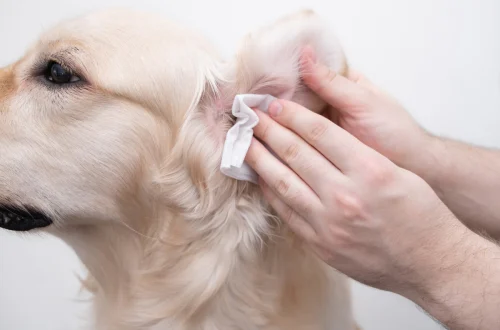While dog kisses are endearing expressions of love and affection, the accompanying breath can sometimes be less than pleasant. Bad breath in dogs, while common, isn’t just an aesthetic concern – it can be an indicator of underlying health issues that deserve attention. Rather than masking the problem with artificial fresheners that may contain questionable ingredients, natural solutions offer a gentler, holistic approach to improving your canine companion’s oral health and breath freshness.
Understanding the root causes of canine halitosis is the first step toward effective treatment. While occasional bad breath might result from something as simple as leftover food particles, persistent odor often signals the need for improved dental hygiene or dietary adjustments. By incorporating natural breath-freshening strategies into your dog’s routine, you can address both the symptoms and underlying causes of oral odor while supporting overall health.
Understanding Canine Oral Health
To effectively address bad breath, it helps to understand what causes it in the first place:
Common Causes of Dog Bad Breath
- Poor Dental Hygiene: Accumulation of plaque and tartar leads to bacterial growth and odor
- Dietary Factors: Certain foods, especially those high in sulfur compounds, can contribute to bad breath
- Digestive Issues: Upset stomach or gastrointestinal problems may manifest as oral odor
- Oral Infections: Gum disease, tooth decay, or mouth injuries create environments for odor-causing bacteria
- Systemic Health Conditions: Kidney disease, diabetes, or liver problems can cause distinctive breath odors
- Dehydration: Reduced saliva production allows bacteria to flourish
Dietary Additions for Natural Breath Freshening
Certain foods and supplements can naturally improve your dog’s breath while supporting overall health:
Fresh Parsley
- Benefits: Contains chlorophyll, a natural deodorizer that neutralizes odors from within
- How to Use: Chop fresh parsley finely and mix a small amount (1/4 to 1 teaspoon depending on dog size) into your dog’s food
- Frequency: Can be added daily as a nutritional supplement
- Caution: Use only fresh parsley; avoid wilted or spoiled herbs
Coconut Oil
- Benefits: Contains lauric acid with antimicrobial properties that help reduce odor-causing bacteria
- How to Use: Add 1/4 to 1 teaspoon (depending on dog size) of virgin coconut oil to food daily
- Additional Benefits: Supports skin health and may improve coat shine
- Introduction: Start with small amounts and gradually increase to avoid digestive upset
Other Beneficial Additions
- Plain Yogurt: Probiotics help balance oral and digestive bacteria
- Mint Leaves: Natural breath freshener (use sparingly and ensure it’s dog-safe mint)
- Apple Slices: Fiber helps clean teeth naturally and provides fresh scent
- Carrots: Crunchy texture helps scrape plaque while providing nutrients
DIY Breath-Freshening Treats
Creating homemade treats allows you to control ingredients while making breath care enjoyable for your dog:
Mint and Parsley Dog Biscuits
- 2 cups whole wheat flour (or oat flour for gluten-free option)
- 1/2 cup rolled oats
- 1/4 cup fresh parsley, finely chopped
- 2 tablespoons fresh mint leaves, finely chopped
- 1 egg
- 1/4 cup water (approximately)
- 1 tablespoon olive oil
- Preheat Oven: Heat oven to 350°F (175°C) and line a baking sheet with parchment paper.
- Mix Dry Ingredients: In a large bowl, combine flour, oats, parsley, and mint.
- Combine Wet Ingredients: In a separate bowl, whisk together the egg, water, and olive oil.
- Create Dough: Add wet ingredients to dry ingredients and mix until a dough forms. Add more water if needed to achieve a workable consistency.
- Roll and Cut: On a floured surface, roll dough to 1/4 inch thickness and cut into desired shapes using cookie cutters or a knife.
- Bake: Place treats on prepared baking sheet and bake for 20-25 minutes until golden brown and firm.
- Cool and Store: Allow to cool completely before storing in an airtight container for up to 2 weeks.
Treat Preparation Tips
- Adjust ingredient quantities based on your dog’s size and dietary needs
- Always introduce new foods gradually to avoid digestive upset
- Store treats in the refrigerator for longer freshness
- Consider freezing portions for extended storage (up to 3 months)
Water Additives for Oral Health
Adding natural substances to your dog’s drinking water can provide continuous breath freshening:
Herbal Water Freshener
- 1 cup fresh mint leaves
- 1/2 cup fresh parsley
- 4 cups water
- Steep Herbs: Bring water to a boil, then remove from heat and add mint and parsley.
- Cool Completely: Allow the mixture to steep for 10-15 minutes, then cool to room temperature.
- Strain: Strain out herb pieces using a fine mesh strainer or cheesecloth.
- Store: Keep in a sealed container in the refrigerator for up to one week.
- Use: Add 1-2 tablespoons to your dog’s water bowl daily, replacing with fresh water every day.
Dental Health Tips
While natural breath fresheners can help, they’re most effective when combined with proper dental care:
Daily Dental Care
- Brushing: Use a dog-specific toothbrush and enzymatic toothpaste to remove plaque daily
- Chewing: Provide appropriate chew toys that help scrape plaque and massage gums
- Water Additives: Consider veterinary-approved water additives that reduce plaque formation
- Dietary Considerations: Feed dental-health-formulated foods when appropriate
Professional Dental Care
- Regular Checkups: Schedule annual dental examinations with your veterinarian
- Professional Cleaning: Most dogs benefit from professional dental cleaning under anesthesia every 1-2 years
- Early Intervention: Address dental issues promptly to prevent more serious problems
Additional Natural Approaches
Beyond dietary additions and treats, several other natural methods can support fresh breath:
Herbal Remedies
- Neem: Traditional Ayurvedic herb with antimicrobial properties (use only dog-safe preparations)
- Chamomile: Anti-inflammatory properties that may help with gum health
- Calendula: Gentle antiseptic that supports oral tissue health
Probiotic Supplements
- Benefits: Help balance oral and digestive bacteria populations
- Forms: Available as powders, capsules, or chews specifically formulated for dogs
- Considerations: Choose products designed for canine use and consult your vet before starting
Foods to Avoid
Certain foods can actually worsen breath or pose health risks to dogs:
Breath-Worsening Foods
- High-Sugar Items: Promote bacterial growth in the mouth
- Dairy Products: May cause digestive upset in lactose-intolerant dogs
- Table Scraps: Often high in fat and salt, which can contribute to poor oral health
- Processed Dog Treats: May contain artificial additives that affect breath
Monitoring and Maintenance
Consistent attention to your dog’s oral health leads to better long-term results:
Daily Checks
- Examine your dog’s mouth weekly for signs of redness, swelling, or unusual odors
- Monitor eating habits and note any reluctance to chew or dropping food
- Observe overall behavior for signs of oral discomfort
Record Keeping
- Track which natural remedies seem most effective for your individual dog
- Note any changes in breath quality after dietary modifications
- Document improvements or deteriorations to share with your veterinarian
Breed and Age Considerations
Different dogs have varying oral health needs:
Small Breeds
- More prone to dental crowding and periodontal disease
- May benefit from more frequent dental care and smaller treat portions
- Require careful monitoring of treat calorie content to prevent weight gain
Senior Dogs
- More susceptible to dental disease and systemic health issues affecting breath
- May need softer treats or modified preparations
- Benefit from more frequent veterinary dental assessments
When to Consult a Veterinarian
Natural remedies complement but don’t replace professional veterinary care:
Immediate Veterinary Attention
- Blood in saliva or excessive drooling
- Difficulty eating or complete refusal of food
- Swelling in the face, jaw, or mouth area
- Sudden, severe changes in breath odor
Professional Consultation Recommended
- Persistent bad breath that doesn’t improve with home care
- Yellow or brown tartar buildup on teeth
- Red, swollen, or bleeding gums
- Loose or missing teeth
Safety Considerations
Even natural ingredients require careful consideration:
Creating a Comprehensive Oral Care Routine
Combining multiple approaches often yields the best results for maintaining your dog’s fresh breath:
Daily Practices
- Brush teeth or provide dental chews
- Add breath-freshening dietary supplements
- Ensure access to fresh, clean water at all times
Weekly Care
- Examine mouth for signs of problems
- Offer breath-freshening treats or snacks
- Clean water and food bowls thoroughly
Environmental Factors
External factors can influence your dog’s oral health:
Water Quality
- Provide filtered water when possible to reduce chemical exposure
- Change water daily to prevent bacterial growth
- Consider water additives that support oral health
Living Environment
- Maintain clean food and water bowls
- Regularly wash dog toys that go in the mouth
- Keep living areas clean to reduce bacterial exposure
Conclusion: Fresh Breath, Happy Heart
Improving your dog’s breath through natural methods represents a holistic approach to pet care that benefits both oral health and overall well-being. By incorporating fresh, wholesome ingredients into your dog’s routine, you’re not just masking odors – you’re supporting the body’s natural processes for maintaining health and preventing the underlying causes of bad breath.
The journey toward better canine oral health is a partnership between you and your furry companion, built on daily care, attention to detail, and genuine concern for their comfort and happiness. While the immediate goal may be fresher breath and more pleasant interactions, the long-term benefits extend to improved digestion, better nutrition, and reduced risk of serious health conditions.
Remember that consistency is more valuable than intensity when it comes to natural remedies. Small, regular additions of breath-freshening foods and supplements are more effective than occasional large doses. This gradual approach also allows you to monitor your dog’s response and adjust accordingly.
As you implement these natural breath-freshening strategies, you’re demonstrating the kind of thoughtful, attentive care that strengthens the special bond between humans and their canine companions. Your dog’s improved breath is just one visible sign of the comprehensive care and love you provide. The real reward is knowing that you’re supporting their health in the most natural, gentle way possible.
Most importantly, never hesitate to seek professional veterinary advice when needed. Natural remedies are a wonderful complement to conventional care, but they’re not a replacement for professional diagnosis and treatment when serious conditions are present. By combining the best of both natural and conventional approaches, you can provide your beloved companion with the comprehensive care they deserve for a happy, healthy life filled with fresh breath and joyful kisses.





